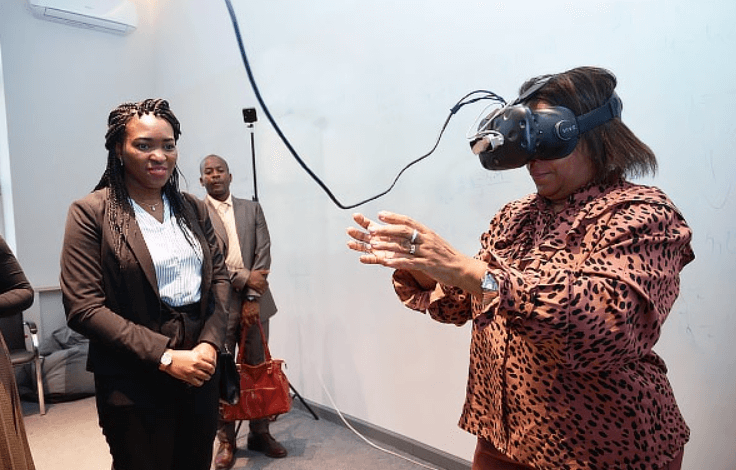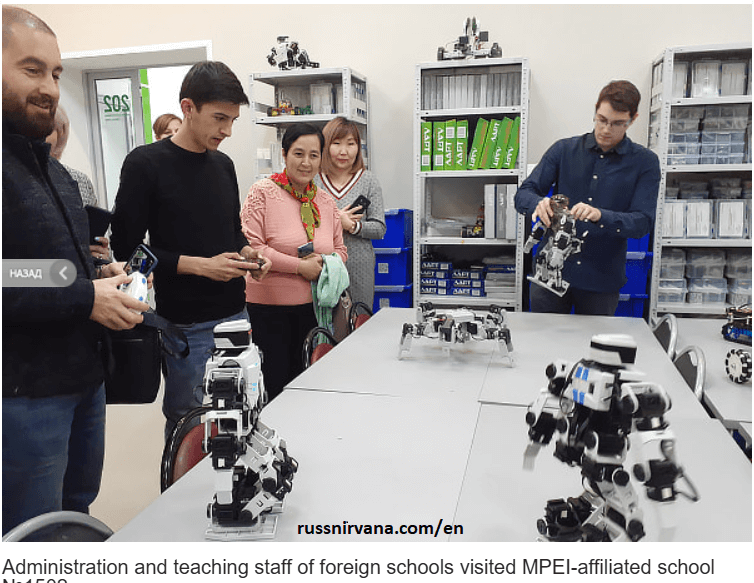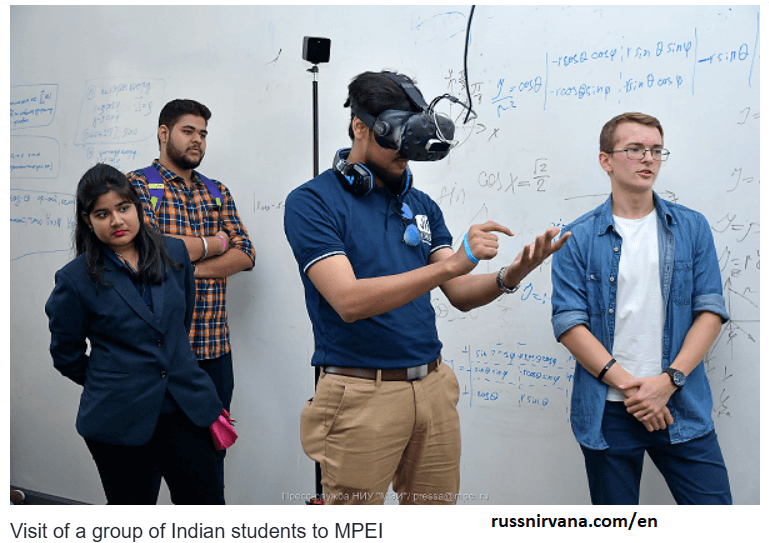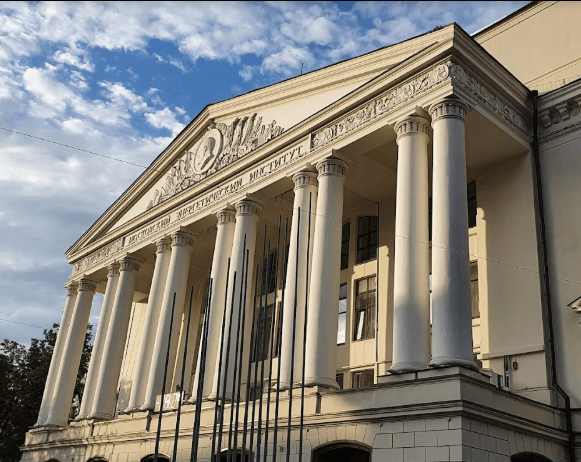About MPEI
The National Research University “Moscow Power Engineering Institute” (MPEI) was founded in 1930 as the main center for training engineers for Russia’s energy industry.
Over the years, it has grown to offer a wide range of programs, including hydropower, wind, thermal, nuclear, solar, and space energy, as well as electrical equipment, materials science, electronics, physics, radio engineering, communications, computer systems, and energy management.
Equipped with modern laboratories and classrooms, MPEI consistently ranks among Russia’s top technical universities. Since 2010, it has held the prestigious status of a National Research University.
With over 100 international academic partnerships and a history of welcoming foreign students since 1946, MPEI is a leader in global education for the power engineering industry.

International Activities at MPEI
The National Research University “Moscow Power Engineering Institute” (MPEI) has been welcoming international students since 1946, producing more than 7,500 graduates from 85 countries. Many alumni now hold key positions worldwide, and MPEI’s degree is highly recognized internationally.
MPEI offers joint degree programs with prestigious universities in countries such as Germany, Finland, Kazakhstan, and Kyrgyzstan. Students can study fields like Electrical Engineering, Power Engineering, and Bioengineering both in Moscow and at partner universities, often earning two diplomas.
As a member of the International Association of Universities (IAU), MPEI participates in global programs run by UNESCO, the International Atomic Energy Agency, IEEE, and others. Currently, over 900 international students from 65 countries are enrolled.
With cooperation agreements with 71 universities across 35 countries, MPEI stands out as a top choice for international education in Russia.
Consultation & Registration:

MPEI Tuition Fee for Foreign Students (2025/26 – USD/year)
1. Full-time Education
1.1. Bachelor’s Degree
(All prices in USD/year, same rate for each year of study)
- Applied Mathematics and Informatics – 4,482
- Fundamental Informatics and Information Technologies – 4,482
- Construction – 4,855
- Informatics and Computer Engineering – 4,855
- Applied Informatics – 4,855
- Information Security – 4,855
- Radio Engineering – 4,855
- Electronics and Nano-Electronics – 4,855
- Bioengineering Systems and Technologies – 4,855
- Thermal Power Engineering and Heat Engineering – 4,855
- Electrical Power Engineering and Electrical Engineering – 4,855
- Power Engineering Machinery – 4,855
- Nuclear Power Engineering and Thermophysics – 5,527
- Mechanical Engineering – 4,855
- Applied Mechanics – 4,855
- Mechatronics and Robotics – 4,855
- Quality Management – 4,855
- Control in Engineering Systems – 4,855
- Economics – 4,482
- Management – 4,482
- Business Informatics – 4,482
- Jurisprudence – 4,482
- International Relations – 4,482
- Advertising and Public Relations – 4,482
- Linguistics – 4,482
- Design – 8,204
1.2. Specialist Degree
- Radio-electronic Systems and Complexes – 4,855 (USD/year for each of 6 years)
1.3. Master’s Degree
- Applied Mathematics and Informatics – 4,705
- Fundamental Informatics and IT – 4,705
- Informatics and Computer Engineering – 5,228
- Applied Informatics – 5,228
- Information Security – 5,228
- Radio Engineering – 5,228
- Electronics and Nano-Electronics – 5,228
- Bioengineering Systems and Technologies – 5,228
- Thermal Power Engineering and Heat Engineering – 5,228
- Electrical Power Engineering and Electrical Engineering – 5,228
- Power Engineering Machinery – 5,228
- Nuclear Power Engineering and Thermophysics – 5,925
- Applied Mechanics – 5,228
- Mechatronics and Robotics – 5,228
- Technosphere Safety – 5,228
- Control in Engineering Systems – 5,228
- Economics – 4,705
- Management – 4,705
1.4. Ph.D. Programs
- Most programs: 5,290 – 5,353 (USD/year) depending on field
MPEI – Latest International Rankings (2025–2026)
QS World University Rankings 2026
- 🌍 #1201–1400 worldwide
- 📚 #451–500 by subject: Engineering – Electrical & Electronic
- 🌏 #163 in Emerging Europe & Central Asia (EECA)
EduRank 2025
- 🌍 #1752 globally (out of 14,131 universities)
- 🇷🇺 #27 in Russia
- 🏙 #13 in Moscow
- 🔬 #135 worldwide in Nuclear Engineering
- 🛢 #606 worldwide in Petroleum Engineering
- ⚙ #624 worldwide in Industrial Engineering
Times Higher Education (latest)
- Ranked in 1001+ group globally
- In subject Engineering: 801–1001 range globally
Programs in English
- Digital Technologies
- Electric Drives
- Energy Technology
- Renewable Energy Sources
- Sustainable Energy Development
- Electrical Systems and Smart Grids
Frequently Asked Questions (FAQ) about MPEI
- Which foreign citizens are eligible to enter the Bachelor course?
Citizens of any country who have successfully completed high school and whose diploma allows entry to universities in their homeland can be accepted. Applicants must be medically fit and financially capable of covering tuition, accommodation, medical insurance, and living expenses in Russia.
- Is distance or correspondence education allowed for foreigners?
No. Such programs are not available for foreigners at MPEI.
- What are the prerequisites for entering the Bachelor course at MPEI?
As MPEI is a technical university, applicants must have successfully studied mathematics and physics in high school.
- How is the Bachelor course organized?
The program is semester-based, with two semesters each year: Fall (from September 1) and Spring (from February 7). Students pass tests at the end of each semester to qualify for exams (4–5 per semester). Failure can result in expulsion.
- What types of classes are used in the Bachelor course?
- Lectures
- Exercises and seminars
- Laboratory workshops
- Independent study in libraries or using computer facilities
- Annual projects and calculations
- Consultations with teachers
- Final exams
In the last year, students may conduct individual research under supervision.
- What are the application requirements for the Bachelor course?
- Scanned education certificate and transcript (notarized Russian or English translation and consular legalization)
- Passport copy (minimum 1.5 years validity)
- Medical certificate and HIV test
- Optional documents such as certificates of competitions or recommendation letters
- What is the document submission deadline?
Applications are accepted all year, but review starts April 1 and ends August 1.
- What is the language of instruction?
Mostly Russian; foreign students must complete a 1-year preparatory course in Russian and basic subjects. The only Bachelor program in English is Computer Engineering and Information Science.
- How long does migration document review take?
Up to 45 days, typically 25–30 days.
- Can the Migration Agency refuse an invitation?
Yes, but rarely—usually due to the applicant’s negative previous record in Russia.
- How is the official invitation sent?
Once the invitation is issued by the migration office, MPEI sends the first-semester invoice (50% of annual tuition). After bank transfer, the invitation and formal letter to the Russian Embassy are sent.
- What is the process for obtaining a Russian student visa?
Invitation from the migration office, MPEI’s letter to the Embassy, passport, visa fee, and other required documents. Visa is issued only for study at the specified university.
- When is the education contract issued?
After acceptance and invitation request, a bilingual (Russian-English) contract is sent to be signed. The final version is signed upon arrival at MPEI.
- What is the validity of the first entry visa?
90 days.
- Is a return ticket required for a student visa?
No. This applies only to tourist visas.
- What are the initial expenses for students?
Accommodation fee, insurance, return ticket, and living costs (USD 250–300/month).
- Can a sponsor make the first payment from abroad?
Yes, provided it is made exactly according to the invoice details.
- Can tuition fees change during the study period?
Possibly for new students, but fixed for signed contracts.
- What are the payment options after the first semester?
USD, EUR, or Russian rubles (based on the official USD rate).
- Can I take extra-curricular courses?
Yes, for an additional fee; not recommended in early years.
- What diploma is awarded upon graduation?
A State Diploma of the Russian Federation in Russian.
- Can Bachelor graduates continue to Master’s level?
Yes, with a recommendation from the commission and after passing entrance exams.
- Are there tuition discounts for children of MPEI alumni?
Yes, 10% off tuition fees.
- What are book expenses for students?
Library use is free; buying books is inexpensive compared to other countries.
Physical location:
- Main education building.
Krasnokazarmennaya st., 17. - Administrative building.
Krasnokazarmennaya st., 14. - Building M.
Krasnokazarmennaya st., 13. - Building E.
Krasnokazarmennaya st., 13E. - Building H.
Krasnokazarmennaya st., 13H. - MPEI Scientific Library.
Krasnokazarmennaya st., 13. - MPEI Printing-house. MPEI Military Dep. shooting gallery.
Krasnokazarmennaya st., 13. - Building X.
Krasnokazarmennaya st., 17X. - MPEI Training-Experimental Heat and Power Plant.
- Building T.
Krasnokazarmennaya st., 17T. - MPEI Culture Center.
Energeticheskiy proezd, 3a. - MPEI Pilot-Production Plant.
Energeticheskiy proezd, 6. - Dining-Hall #10.
Lapina St., 17v. - MPEI Sport facilities. Swimming pool.
Krasnokazarmennaya st., 13b. - MPEI Health Centre.
Energeticheskaya st., 8, bld 3. - Hostel.
Energeticheskaya st., 10, bld 1. - Hostel.
Energeticheskaya st., 14. - Hostel.
Energeticheskaya st., 18, bld 2.

Our services include:
- Registration at MPEI University
- Airport transfer
- SIM card purchase
- Bank account opening
- Hotel booking
- Dormitory reservation
- City tour
WhatsApp Number: +7977102-72-61
